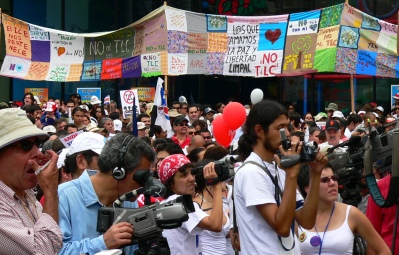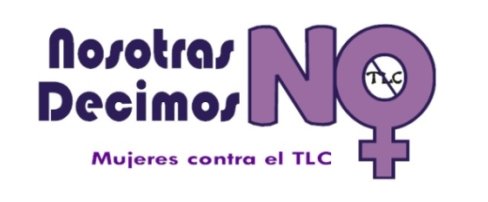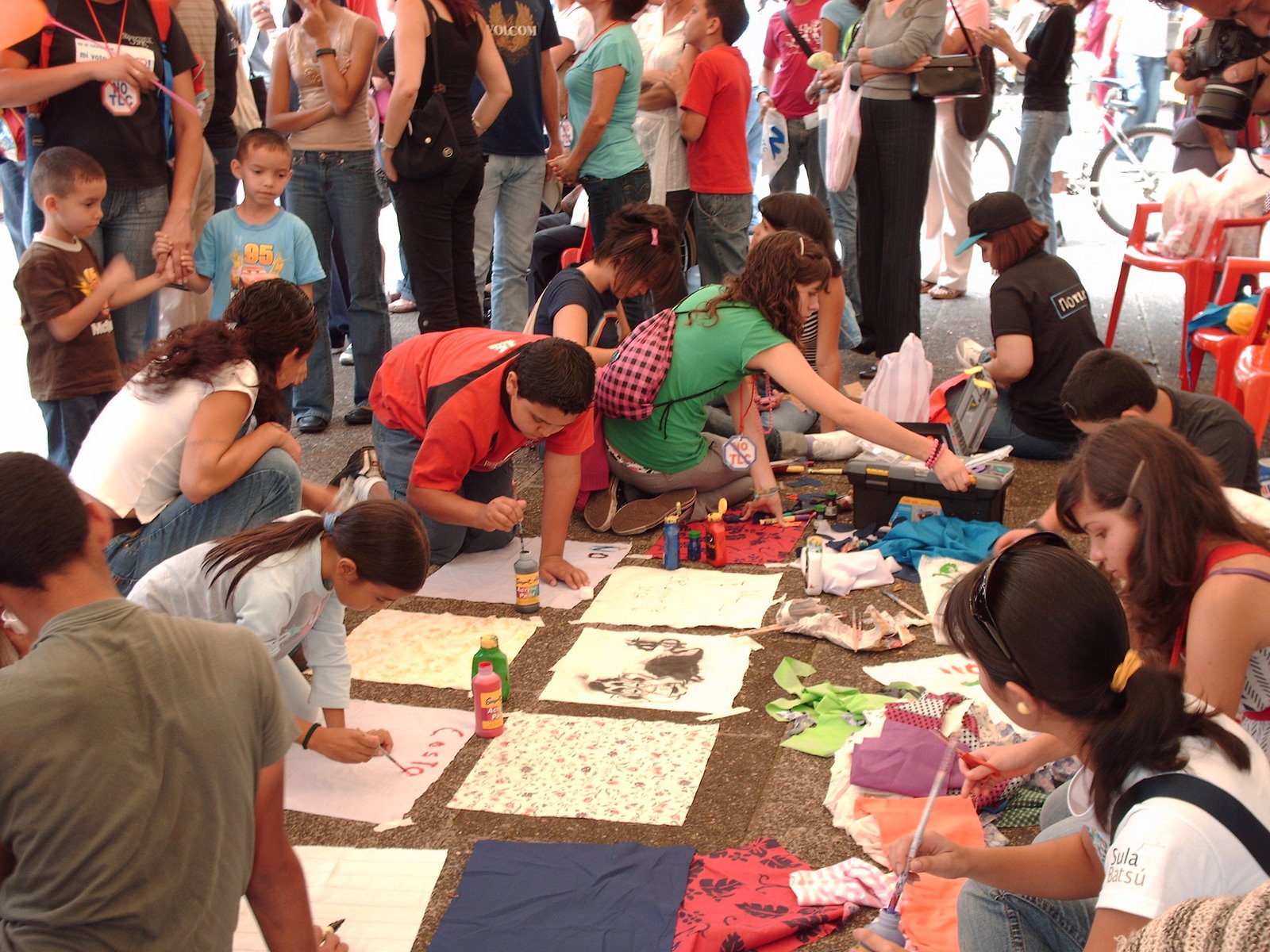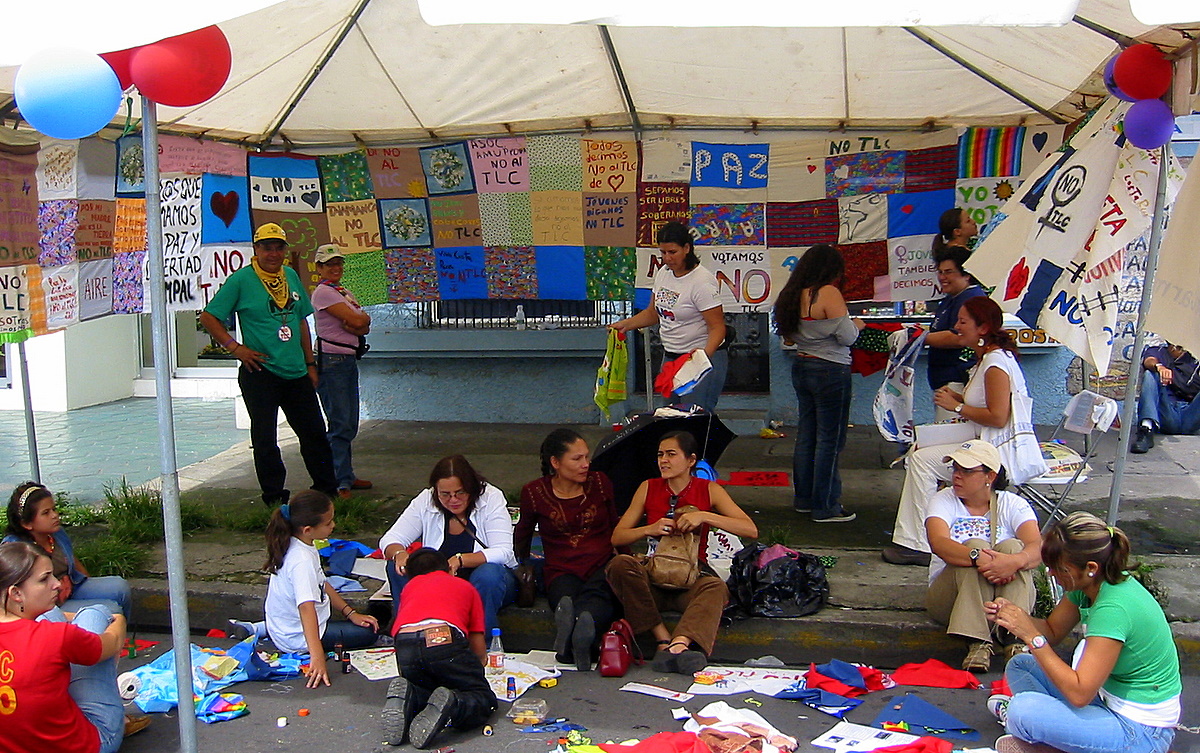Women versus CAFTA: declaration of the “Women of NO”
All the versions of this article: [English] [Español] [français]
Women versus CAFTA: declaration of the “Women of NO”
Mujeres del NO
October 2007

“Mujeres contra el TLC” was the name we gave ourselves during the brave period of struggle that will be remembered in history as the Campaign against CAFTA. We are the creators of the Banner of Our Dreams, in which thousands of people have left their marks of rejection to the treaty and to the imposition of adventurist neoliberal politics, which surrender goods and services that belong to the people to private businesses so that they can profit from the basic necessities of the population. This politics affects women, responsible for the reproduction and care of life on Earth, particularly deeply. It endangers our Social State of Law, which, although far from perfect, has allowed us to survive in better conditions than our fellow Central American sisters.
“Mujeres del NO” was the name of our daily programme on Radio Actual, which allowed us to become part of the forces fighting against the media dictatorship taking over the planet in the last few decades, with the purpose of silencing millions of diverse voices that oppose the imposition of neoliberal politics, which turns into a private business what used to be a common good. In this programme we have given a voice to dozens of women from different fields, because we are convinced that each and every voice has truth and reasons why it should be heard and that is why we made audible the resistance of women to CAFTA and its development model.
Aware of the marginalised role historically given to women’s participation in emancipation movements throughout the centuries, we organised the “Power of NO” event on September 29, erecting tents to enable participants to interpose any complaint about irregularities and abuses of power regarding the referendum process, complaints that are currently being analysed through judicial research for national and international presentation.
Tents for other purposes were also set up: the Information Tent to train referendum supervisors (fiscales), the Legal Tent to complain about irregularities or violations of electoral rights, the Feminist Observatory of Transformational Politics Tent to participate in hearings with women from Mexico and other Central American countries that have already ratified free trade agreements with the US, and of course the Banner Tent to keep sewing our rejection of the agreement. At the end of the day, a great concert took place to celebrate the political creativity of a NO that goes far beyond repudiation of the CAFTA, because it comes from the will to care, nourish and protect life on this planet.
Our communication work in the region helped in the creation of an international conscience by a number of organisations and institutions, specially by La Jornada de México daily, which titled a recent editorial “La vulneración de la Democracia en Costa Rica” (The transgression of democracy in Costa Rica), in reference to the irregularities observed during the process. We also connected this local struggle to international organisations and movements fighting for peace, equality and justice, achieving a declaration from the Nobel Women’s Initiative, which expressed its disappointment with an electoral process that could have been an example to the world but turned out to be another example of the abuse of power by many powerful public officials.
Our actions against the politics implied by the CAFTA are not only recent. In 2000 we were part of “Mujeres contra el Combo”, and in 2002 many of us participated in the planning of the 9th Latin American and Caribbean Feminist Encounter, with the theme “Resistance against Neoliberal Globalisation”, which reunited more than 800 feminists from the region, who declared against neoliberalism owing to its impact not only on women’s lives, but on the planet itself.
Today, after the culmination of this process of abuse and violation of many human rights, we want to demonstrate that we remain alert as we wait for the results of the manual recount demanded by various social sectors, due to the anomalies witnessed by many referendum supervisors, guides and voters; which include the arbitrary intent to annul votes, signs of trying to buy votes, and the legal impugnment over the unconstitutionality of the referendum itself.
We strongly oppose the "Leyes de Implementación" (Implementation Laws), which, at the government’s insistence, did not form part of the referendum. We consider that before discussing those and other laws, we need to agree on the model of society we want for Costa Rica. As feminists we will fight for that model not to be based on the unrecognised or ill-paid labour of poor women, without forgetting that that kind of exploitation is framed under the context of discrimination and subordination of all women.
We are still preoccupied with the victorious attitudes of a government which, having been elected by a small margin 2 years ago and having won the referendum by about 3%, presumes to have the power to continue with a CAFTA rejected by at least half of those who voted. A half that was not intimidated by the well-documented threats of the Bush Administration and the politics of the Memorandum of Vice-president Casas and congressman Sánchez. A half that with conviction, passion and creativity opposed the CAFTA because the consequences it carries for health services, education, phone services, electricity services, water services, etc. were studied and analysed together with the exploitation of the human, marine and land resources of the country.
Because women were over half of the voters who voted NO, and because as feminists we have always opposed extending the exploitation and discrimination against women to those men who are less powerful or to our natural resources, we are going to insist that the laws required to implement CAFTA will not be negotiated only in Congress. They must be negotiated by all who have worked hard to make Costa Rica a democracy.
Furthermore, because as women we know inequality and because we have struggled against it for millennia, we will not accept a referendum that was tainted by partial and even illegal decisions by the TSE and by an arrogant abuse of power by the president and other high officials, all of which are well documented. For millennia we have resisted the power men exercise over our bodies and our right to choose based on the unequal power relations between women and men, so too today we will not accept that those who have the economic and political power in this country have, for that reason alone, the power to violate the will of the majority of Costa Ricans who do not want this so called agreement.
There is ample evidence that the rules made by the TSE did not guarantee equality or freedom of choice during the process leading up to the referendum. Radio and television transmissions were not obliged to give equal time to both sides, nor were citizens guaranteed a minimum of access to impartial information about the agreement. Freedom of choice was not guaranteed when the president himself was allowed to freely campaign for the Yes. How can we accept that the people freely chose to ratify the agreement when the choice was tainted by threats made by the largest multinationals in the country of firing everyone if the NO won, or by threats of a collective suicide if the NO won made by the president himself, not to mention the threats by the US Ambassador and even the White House?
| As feminists we have always said NO to rape and therefore we cannot but say NO to this gang rape of our collective freedom to choose what treaties we accept. |
As women we know about frustration when those who have raped our bodies are left unpunished, or, worse still, when the crime is not even recognised and we are accused of meaning yes when we have said NO. That is why we will not remain silent about the fact that there were no real sanctions made by the TSE when the Yes campaign violated the prohibition to campaign two days before the referendum, after the polls showed that the NO was 12 points ahead. We will insist that the process itself was tainted, as was the decision to vote yes by so many Costa Ricans. As feminists we have always said NO to rape and therefore we cannot but say NO to this gang rape of our collective freedom to choose what treaties we accept.
From now on “Mujeres contra el TLC” will call itself “Mujeres del NO” (Women for the NO).
- A NO that is directed not only at the implementation laws, but a NO to the abuse of power, whether in our homes or in the country.
- NO to public or private violence, whether it is exercised by the President of the Republic or by the Head of the Household.
- NO to that which is blindly called “development”.
- NO to the overvaluation of production over reproduction.
- NO to capitalist greed as natural.
- NO to discrimination against women.
- NO to the disappearance of our millenary resistance.
The Banner of Our Dreams will continue to travel throughout Costa Rica and the whole world so that anyone can express in it what they have not been given the chance to say in the media. It will continue to safeguard the space for dreaming a world where every colour of the human rainbow can have a voice to demand with dignity, without the slavery of unabated production and consumption of unnecessary and inert goods, a planet full of poetry, beauty and happiness.
— San José, Costa Rica, 18 October 2007

Source: Feminist International Radio Endeavour








